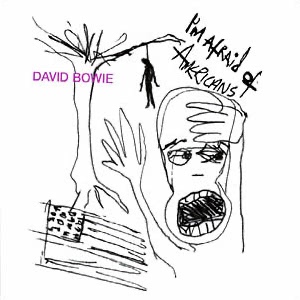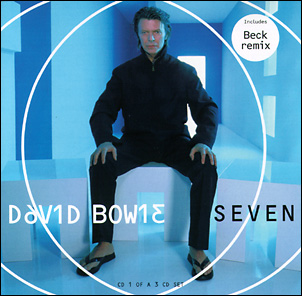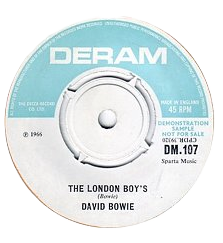
Earthling is the 21st studio album by the English musician David Bowie, released on 3 February 1997 through RCA Records in the United Kingdom, Virgin Records in the United States, and Arista Records/BMG in other territories. Mostly self-produced by Bowie, it was primarily recorded from August to October 1996 at New York City's Looking Glass Studios. Bowie composed the tracks with Reeves Gabrels and Mark Plati, who are credited as co-producers, with Mike Garson, Gail Ann Dorsey and Zack Alford providing overdubs later.

"I'm Afraid of Americans" is a song by the English musician David Bowie, released as a single from his album Earthling on 14 October 1997 through Virgin Records. The song was co-written by Bowie and Brian Eno and originally recorded during the sessions for Bowie's 1995 album Outside; this version was released on the soundtrack of Showgirls (1995). The song was then remade during the sessions for Earthling, featuring rewritten lyrics, overdubs and transposed verses. An industrial and techno track, it presents a critique of America through the eyes of a stereotypical "Johnny" and is characterised by drum patterns, synthesisers, various loops and vocal distortions.

Tin Machine is the debut studio album by the Anglo-American hard rock band Tin Machine, released on 22 May 1989 through EMI America Records. The band consisted of the English singer-songwriter David Bowie, the American guitarist Reeves Gabrels and brothers Tony Fox and Hunt Sales on bass and drums, respectively, while Englishman Kevin Armstrong acted as an additional guitarist. The project was spearheaded by Bowie, who felt disconnected in his career by 1987 and looked to reinvent himself. After meeting Gabrels through his Glass Spider Tour, the two agreed to work together and would collaborate frequently for the next decade. Bowie hired the Sales brothers, neither of whom he had worked with since the 1970s, after a meeting in Los Angeles, while English producer Tim Palmer was hired to co-produce.

Hours is the 22nd studio album by the English musician David Bowie. It was originally released on 21 September 1999 through the Internet on the artist's website BowieNet, followed by a physical CD release on 4 October through Virgin Records. It was one of the first albums by a major artist available to download over the Internet. Originating as a soundtrack to the video game Omikron: The Nomad Soul (1999), Hours was the final collaboration between Bowie and guitarist Reeves Gabrels, with whom he had worked since 1988. The album was recorded in mid-1999 between studios in Bermuda and New York City. A song contest conducted on BowieNet in late 1998 resulted in a fan contributing lyrics and backing vocals to one of the tracks.

Tin Machine Live: Oy Vey, Baby is a live album by Anglo-American rock band Tin Machine, originally released through London Records on 2 July 1992. The album includes songs, all from the band's two albums, recorded between 20 November 1991 and 11 February 1992 from five different venues on the North American and Asian legs of Tin Machine's It's My Life Tour. The maligned album title was intended as a pun on U2's 1991 album Achtung Baby. Oy Vey, Baby has received negative reviews, with many criticising the performances. It failed to chart in both the UK and the US. It was accompanied by a concert video of the same title, which was filmed at The Docks, Hamburg on 24 October 1991. Following its release, Tin Machine disbanded and Bowie quickly resumed his solo career with Black Tie White Noise (1993).

"I Dig Everything" is a single by the English singer-songwriter David Bowie. It was his final single for Pye Records, released on 19 August 1966. The track was originally demoed with Bowie's then-band, the Buzz, but producer Tony Hatch was unhappy with their efforts and replaced them with session players. It is a pop song that musically and lyrically reflected the mid-1960s Swinging London era. The single was another commercial failure and resulted in the label dropping him. The original recording was included on the Early On (1964–1966) compilation in 1991.

"Stay" is a song by the English musician David Bowie, released on his 1976 album Station to Station. The song was recorded in late 1975 at Cherokee Studios in Los Angeles. Co-produced by Bowie and Harry Maslin, the recording featured guitarists Carlos Alomar and Earl Slick, bassist George Murray, drummer Dennis Davis, pianist Roy Bittan and Warren Peace on percussion. The track features prominent dual guitar work from Slick and Alomar, who mostly composed it in the studio. Based on the chord structure of "John, I'm Only Dancing (Again)", a funk reworking of "John, I'm Only Dancing" (1972), "Stay" emulates funk rock, soul and hard rock. The song's lyrics are abstract and relate to love.

"Look Back in Anger" is a song written by English artists David Bowie and Brian Eno for the album Lodger (1979). It concerns "a tatty 'Angel of Death'", and features a guitar solo by Carlos Alomar.

"Dead Man Walking" is a song by English musician David Bowie, released as the third single from his 21st studio album, Earthling (1997). Written by Bowie and Reeves Gabrels, it was a top 40 hit in the UK, peaking at number 32. Bowie described "Dead Man Walking" as his homage "to rock and roll that is still young while we are all growing old". As such, the lyrics reflect his thoughts on aging at this point in his career.

"Thursday's Child" is a song recorded by David Bowie for his twenty-second studio album Hours (1999). Written by Bowie and Reeves Gabrels, the song was released as the album's lead single on 20 September 1999, by Virgin Records.

"Survive" is a song by the English musician David Bowie from his 1999 album Hours. It was later released in remixed form as the album's third single on 17 January 2000, reaching number 28 in the UK. Written by Bowie and Reeves Gabrels, it is a reflective number detailing the end of a relationship. Musically, it recalls the sound of Bowie's folk rock music of the late 1960s, and 1971's Hunky Dory. Its music video echoes the reflective quality of the recording, portraying Bowie levitating at a kitchen table with an egg. Praised as a highlight of Hours, Bowie performed "Survive" frequently through 1999 and 2000.

"Seven" is a song written by David Bowie and Reeves Gabrels for the album Hours in 1999. As with some of the other songs from Hours it was originally written for the computer game Omikron - The Nomad Soul from 1999. In July 2000, it was released as the fourth single from the album. The version used in the Omikron – The Nomad Soul was called "Demo version" on the single releases.
"Baby Loves That Way" is a song written by David Bowie in 1965 and released as the B-side of single "You've Got a Habit of Leaving" under the name Davy Jones with his band at the time, the Lower Third, who were uncredited. Bowie later remade the song during the sessions for his Toy album in 2000, which was officially released in 2021.

"Can't Help Thinking About Me" is a song written by the English musician David Bowie and recorded with his band the Lower Third. Released as a single by Pye Records on 14 January 1966, it was the first one issued under the "David Bowie" name after previously performing as Davy Jones or Davie Jones. The recording was produced by Tony Hatch, who also contributed piano. The session took place on 10 December 1965 at Marble Arch Studios in London. A rewrite of Bowie's "The London Boys", the song concerns a boy found guilty of an act that decides to leave town to start anew. It is noted by biographers as showcasing Bowie's growth as a songwriter, displaying themes he would utilise in his later work. Musically, the song explores the contemporary mod sound of the Who and the Kinks.

"The London Boys" is a song by the English musician David Bowie. It was first released as the B-side of the single "Rubber Band" in the United Kingdom on 2 December 1966. It was originally written and demoed in 1965 with the Lower Third for potential release as the artist's debut single for Pye Records but it was rejected. After a year of rewrites, he recorded a new version with a new band, the Buzz, which helped secure him a record contract with Decca-subsidiary Deram Records. Unlike the A-side, "The London Boys" retains the Mod feel of Bowie's previous singles. The dark lyrics concern a 17-year-old who leaves home for London and becomes embroiled in the Mod scene, turning to pills to fit in. Like his previous singles, it failed to chart. Decca later issued it as an A-side in 1975..

LiveAndWell.com is a 1999 limited edition live album by David Bowie. It was not available commercially and could only be acquired by being subscribed to BowieNet at the time. The album is made up of recordings from the 1997 Earthling Tour, featuring songs from the albums Outside (1995) and Earthling (1997)
The Hours Tour was a small-scale promotional concert tour by the English singer-songwriter David Bowie comprising a handful of live performances and numerous television appearances in support of the album Hours in late 1999. Several live songs from the tour were included as b-sides to singles from the album, and concert recordings from the tour were released in 2020 as Something in the Air and in 2021 with David Bowie At The Kit Kat Klub .

Brilliant Adventure (1992–2001) is a box set by English singer-songwriter David Bowie, released on 26 November 2021. A follow-up to the compilations Five Years (1969–1973), Who Can I Be Now? (1974–1976), A New Career in a New Town (1977–1982) and Loving the Alien (1983–1988), the set covers the period of Bowie's career from 1992 to 2001, commonly regarded by analysts as an artistic renaissance following his commercially successful but critically maligned work in the 1980s. However, Bowie's 1988–1992 tenure with the hard rock group Tin Machine is excluded. The set comprises eleven compact discs or 18 LPs.
"Let Me Sleep Beside You" is a song written and recorded by the English singer-songwriter David Bowie. It was recorded on 1 September 1967 at Advision Studios in London and marked the beginning of Bowie's working relationship with producer Tony Visconti, which would last for the rest of Bowie's career. A departure from the pop and music hall-influenced material of Bowie's 1967 self-titled debut album and other singles for Deram Records, the song displays a more rock-oriented sound with a cello arrangement from Visconti. The impressionist lyrics also depart from Bowie's prior works, describing love using the act of sleeping together rather than through emotional attachment. The song was rejected by Deram for release as a single, purportedly due to the risqué title. It remained unreleased until 1970's The World of David Bowie compilation.
"Karma Man" is a song written and recorded by the English singer-songwriter David Bowie. It was recorded on 1 September 1967 at Advision Studios in London and marked the beginning of Bowie's working relationship with producer Tony Visconti, which would last for the rest of the artist's career. The song expresses Bowie's growing interest in Tibetan Buddhism, concerning a character who is put on display as a "freak" in a carnival tent. The music reflects the Buddhist themes and was likened to the works of the Beatles. Initially proposed as a B-side, it remained unreleased until The World of David Bowie compilation in March 1970. Bowie performed the song during two of his BBC radio sessions, one of which was released on the 2000 compilation Bowie at the Beeb.
















